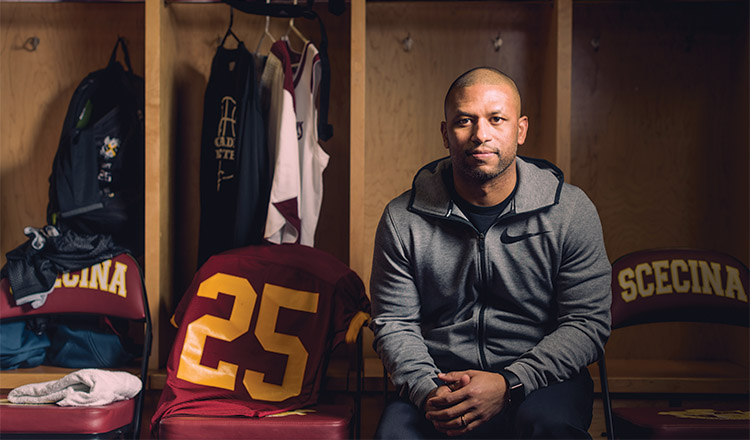How athleticism delivered Donald Winston from a life of poverty, hardship
When a teacher asked Donald Winston what the most important thing in his life was, the freshman at Scecina Memorial High School in Indianapolis had a one-word answer: Football.
Winston (T’00, MS T’01) was a non-Catholic and an African American in a predominantly white Catholic school. Kay Andres thought her student had given an immature response to a serious question in her Christian studies class. But Winston wasn’t thinking only about gridiron glory. He had figured out at a very early age that his athletic ability could be his escape from a life that began in urban poverty with threats of violence, drug addiction, gang war, and other crime waiting under every street light.
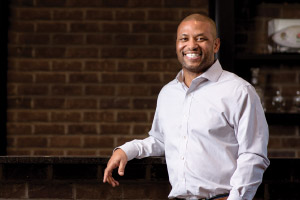
“I had to explain to Mrs. Andres that football was allowing me to get a good education,” Winston says. “It was opening up all these different doors for me. Most of the kids at Scecina weren’t in the financial situation I was in.” Anonymous donors, known as Godparents, paid 100 percent of Winston’s high school tuition for four years. The arrangement required Winston to help out at the school. “I cleaned the gym after volleyball games and other events until I got out of high school,” he says.
Exceptional athleticism allowed Winston to excel in every sport he tried. In addition to football, he starred on the basketball court and — as a high school junior — cleared 7 feet to win the Indiana high-jump state championship. Despite standing only 5-foot-7 and weighing about 160 pounds, he had about 300 scholarship offers from Notre Dame and schools in the Big Ten, the Big 12, and the Southeastern Conference. Division 3 institutions recruited him for basketball. One football offer came from the University of Wyoming, where, in 1996, a coach named Joe Tiller was running a pass-heavy spread offense that might have been perfect for a speedy little receiver.
Winston didn’t want to go to Wyoming. “I still don’t,” he laughs. Instead he accepted an offer from Purdue’s Jim Colletto. One season later, Colletto was gone, and Tiller arrived in West Lafayette to take over the Boilermaker program.
As a wide receiver and kick returner, Winston was a solid contributor on the Tiller-led teams that would take Purdue to the 2001 Rose Bowl. Injuries would keep him from accomplishing everything he dreamed of on the field, but he never forgot that football was a means to an end. The real goals were education and career.
Two Different Worlds
Today Winston is vice president of operations with the Ardagh Group, an international packaging corporation with 23,500 employees in 22 countries. The comfortable home where he lives with his wife, Laura, and two children in suburban Carmel, Indiana, is a few miles and light years from a housing project in Haughville, the west side Indianapolis neighborhood where he spent the first eight years of his life. Haughville then had one of the highest homicide rates in America. In the 1990s, according to Indianapolis police statistics, more than one out of three residents had been a victim of violent crime.
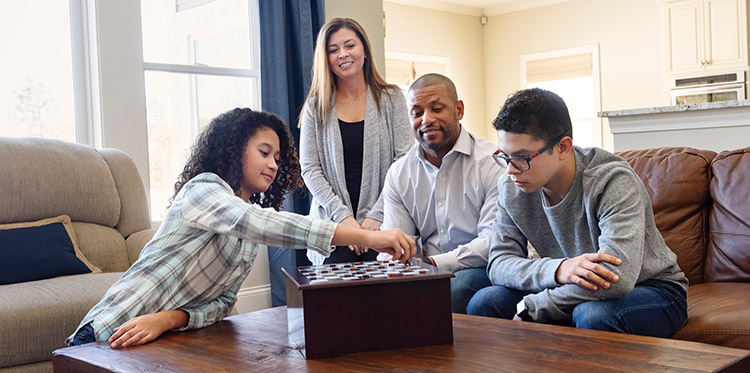
Donald and Laura Winston were high school sweethearts from different schools. They met at a summer teen hangout when both were 16 and dated for six years before marrying. Laura graduated from Indiana University. She works occasionally as a dental hygienist, but her primary job is home-schooling son Adrian, 14, and daughter Zaria, 11.
“We strive daily to put God first, so we attend church every Sunday together,” Laura says. “With the kids both in sports, most of our time is spent at baseball and soccer fields. But Donald and I wouldn’t have it any other way.”
The family volunteers at Wheeler Mission, a ministry that provides food and other assistance to homeless people, in the same neighborhood where Donald grew up. Many of the homes there are now boarded up with overgrown lawns.
“Our kids are growing up a lot differently from Laura and me,” Winston says. “We want them to understand that a lot of people are less fortunate.” Winston understands the critical role community programs play for struggling families. Although he never lived on the street as a boy, he remembers frequent evictions and depending on extended family for shelter.
When Winston was 8 years old, his mother qualified for a federal rent subsidy program that allowed her to move with her three children out of Haughville to the Brookside neighborhood on the east side of Indianapolis. It was more diverse with both black and white families, but still a tough, poverty-ridden area. The rental assistance helped, and for Donald and his older half-brother, Ervin Hillman, the location presented a new opportunity.
Across the street from their duplex was the practice field of the St. Philip Neri grade school football team, a member of the Catholic Youth Organization. CYO programs welcomed neighborhood children, even if they attended public schools and weren’t Catholic. Hillman and later Winston joined the St. Philip’s team, and Winston began to meet people who would help him change his life.
Three-Way Split
Jim Brennan has been coaching youth football for more than 28 years, and he remembers Donald Winston as one of the special kids. “From the very beginning, he wanted more from it than football,” Brennan says. “Donald was determined to make his life better, and he understood how important education was. His home situation was difficult. His father wasn’t around, and they just didn’t have much. Sometimes they’d be evicted. They’d move out of the neighborhood, then they’d move back again.”
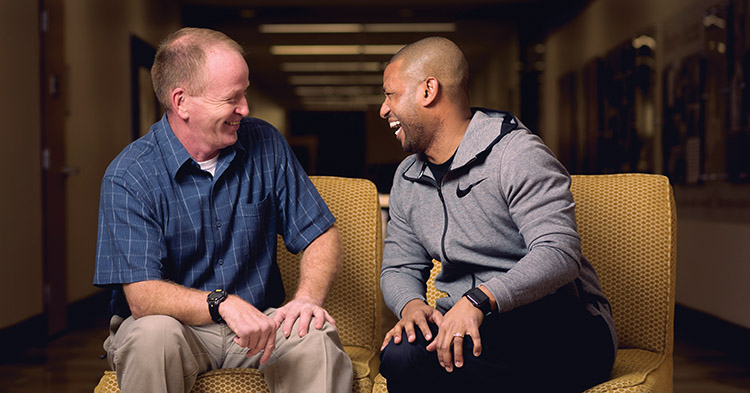
Wherever the family moved, Brennan, who also lived in Brookside, made sure Winston got to football and basketball practices. From fifth grade through eighth grade, the coach picked him up and drove him home every day, round trips that took up to two hours. With Brennan’s guidance and help, Winston switched to the Catholic schools, enrolling at St. Philip in eighth grade. The price of tuition for students who qualified for the low-income family program was $21 per week. Winston’s mother and Brennan each paid $7.
The other $7 came from the Long family. Winston and Robbie Long met on the St. Philip practice field, where they formed a bond that transcends race and goes beyond friendship. Each refers to the other as “my brother.” Soon Winston began spending every weekend at Long’s home. This continued until Winston was a sophomore at Scecina when he moved into the Long household full time, sharing a bedroom with Robbie and his younger brother. “We were The Blind Side before it was a movie,” Long says, referring to the 2009 film about a wealthy white family that takes in a homeless black teenager and helps him develop into a collegiate and professional football player.
One difference was that Jerry and Debbie Long were far from wealthy. However, they had something their full time house guest craved and still treasures: a stable home life. He spent every holiday with the Longs and was included in all family events. When Debbie Long passed away in 2013, her obituary listed Donald Winston as a surviving son.
Robbie Long, now a machinist in Indianapolis, says there was always something special about Winston. “He was just on a different level from everyone else. He was determined to have something better than what we grew up with. He always knew how to make the most of opportunities. People are just drawn to him. We still see each other or talk a couple of times a week.”
“He was determined to have something better than what we grew up with. He always knew how to make the most of opportunities.”
Robbie Long
Brandon Folck (A’00), another boyhood friend, says of Winston, “It is amazing what hard work, perseverance, and an unwavering belief in oneself can accomplish.” Folck, director of safety standards for Ryder System, played two years of football with Winston at Scecina and roomed with him for a year at Purdue.
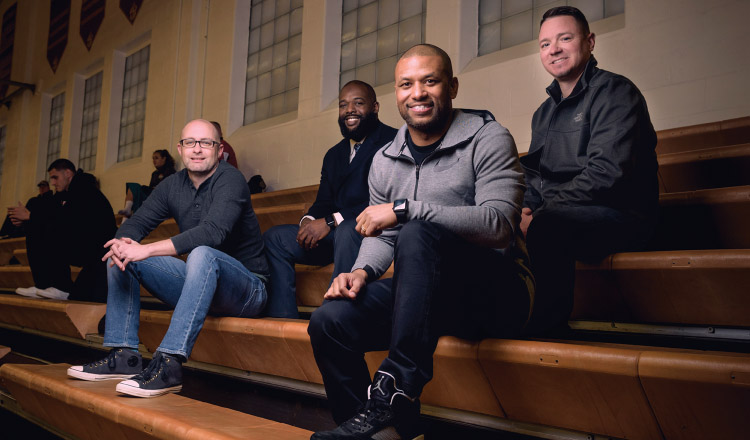
Before he moved in with the Long family, Winston had a difficult home life. He says it was a loving environment, but things were never stable. His mother, Glenda Thacker, worked hard and tried to make a good home, but there was never enough money. Food stamps and other public assistance were part of the family budget. While working, she went to night school, and when Winston was 10, he attended her high school graduation. She became a certified nursing assistant and still works in that field. While raising Winston and his two siblings, her greatest fears were drugs and gang involvement, but she says, “Donald was always a leader, never a follower, and he was smart — a good student.”
Winston describes his father, Anthony Winston, as “a hustler” who was in and out of jail throughout his son’s boyhood. “He worked sometimes but never had a steady job. A hustler just does whatever he has to do to make money. It might be legal; it might be illegal, but he’ll do it.”
Winston’s parents never married. Their 10-year relationship ended when he was 8 years old, but his father would be around from time to time. “He wanted me to come and live with him, but things were never stable enough around him for that. I tried to do the opposite of what my father did — and I told him that,” Winston says.
A few weeks after Winston enrolled at Purdue, his father was murdered by the jealous boyfriend of a woman he had driven to a grocery store. Winston recalls that the woman was a former girlfriend of his father, but the relationship had ended. “He was just trying to help her out, because she needed a ride.” The man, who stabbed Anthony Winston to death with a box cutter, remains in prison.
An Aha Moment
Donald Winston believes his athleticism was only one of the gifts he was born with. “I think I had a God-given ability to see things clearly,” he says. “I knew from the time I was very young that our life wasn’t right.”
Despite that clarity of vision, he didn’t know any life other than the one he was living. He remembers “an aha moment” when he was invited to a party at a friend’s home: “It wasn’t a fancy house, but I had never seen anything but the apartments in projects and tenements. I said, ‘You live here? Your parents are both around? They’re married?’ I knew those were the kind of things missing in my life.”
Most of the people he knew as a teenager were involved with gangs, drugs, or both, Winston says, but he was not pressured to become part of that life. “They saw me as an athlete,” he says. “And they thought I had a chance to get out of the life they were living. They wanted me to succeed, so they left me alone.”
Winston came to Purdue in 1996, determined to get an education that would provide the foundation for a career, but also believing he had a shot at a future in professional football. An excellent receiver and kick returner, he saw plenty of playing time and was a starter on the 2001 Boilermaker Rose Bowl team.
Drew Brees (M’02), quarterback of that team and now a National Football League star, recalls Winston as “smart, tough, and a great person to be around.” Brees adds, “I also remember him being very focused on getting his degree and preparing for life after college. Definitely someone the younger guys could look up to. When the ball was in his hands, it was exciting. I’ve played with a few guys very similar to him in the NFL.”
Seth Morales (EDU’03) and AT Simpson (LA’02), also wide receivers on that team, both saw Winston as a role model. Simpson, now president of an Indianapolis construction firm, says, “Donald taught me that when you do things the right way, things turn out well for you.”
After graduating from Purdue, Morales earned an MBA at Notre Dame and now is president of the Morales Group, a family firm that helps aspiring workers find jobs. “Donald was the real leader of that Rose Bowl team,” Morales says. “He had the kind of edge that makes him special. It’s what makes him a great dad and successful in his career.” Morales says Winston is the catalyst for getting his former teammates together regularly for breakfast or lunch.
Winston’s dream of an NFL career hit one insurmountable obstacle: “I couldn’t stay healthy,” he says. A leg injury slowed him as a freshman. Later came three foot fractures, resulting in two surgeries. Each time, he came back to play, but he knew a pro football career was not going to happen for him. Recovery from the injuries extended his football eligibility, and he used the time to complete his bachelor’s and then his master’s degrees.
Regrets about football? “My real dream wasn’t to be a football star. My dream was to be a husband and father. I hug and kiss my kids and tell them I love them every day.” He also goes back to his schools in inner-city Indianapolis to talk to the young people now playing for his former coaches. “I tell them sports are great, but sports are a long shot. Education is a sure thing.”

